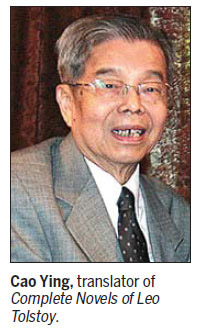A master of Tolstoy
Updated: 2012-03-27 11:13
By Shi Yingying in Shanghai (China Daily)
|
|||||||||||
 |
Shanghai-based translator Cao Ying celebrated his 90th birthday on Saturday and was given a new copy of Complete Novels of Leo Tolstoy, in Chinese with colored illustrations.
Cao Ying is the country's only person to have translated the complete works of Tolstoy - a feat comprising 4 million words in 12 volumes.
With the publication of the works, Cao Ying finally fulfilled his promise to Ba Jin (1904-2005), one of China's most widely read writers of the 20th century.
In 1950, Ba Jin bought the original copy of Tolstoy's anthology, which includes 200 colored and black-and-white illustrations, for 800 yuan ($127). Cao Ying then dreamed of publishing his own translated version.
So Ba Jin sent the copy as a gift to Cao Ying, who spent nearly two decades completing the translation from Russian to Chinese.
"They became good friends because of Tolstoy. Cao Ying kept Ba Jin posted with his translation process and Ba Jin encouraged him to work," recalls Cao Ying's wife Sheng Tianmin.
Cao Ying, the translator's pen name, literally means "grass infant". Born as Sheng Junfeng, to a well-to-do family in Zhenhai, Zhejiang province, he grew up in an era when China was greatly influenced by the former Soviet Union.
As a teenager, Cao Ying admired Lu Xun (1881-1936), whose translations of Russian and Japanese literary works struck a chord with him.
After reading a book introducing the then Soviet Union, Cao Ying said he was instilled with a strong wish to learn about the energetic new society and started to learn Russian.
The translator started to make his name in 1956, when his translation of Galina Nikolaeva's Director of the Machine Tractor Station and the Chief Agronomist became popular and was serialized by China Youth magazine, which published 3 million copies an issue.
However, during the "cultural revolution" (1966-76), the translator, regarded as "the agent of Sholokhov" and "a revisionist USSR spy", was sent to do farm work in the countryside.
The heavy labor took a toll on his health. But he survived.
He decided to devote his remaining years to translating Tolstoy's complete works, explaining that it was because he saw the need for the restoration of humanitarianism after the "cultural revolution".
He started the arduous work in 1978 and kept a strict regimen of working at least seven hours a day. He finally finished in 1997, aged 75.
Today's Top News
Rescuers race against time for quake victims
Telecom workers restore links
Coal mine blast kills 18 in Jilin
Intl scholarship puts China on the map
More bird flu patients discharged
Gold loses sheen, but still a safe bet
US 'turns blind eye to human rights'
Telecom workers restore links
Hot Topics
Lunar probe , China growth forecasts, Emission rules get tougher, China seen through 'colored lens', International board,
Editor's Picks

|

|

|

|

|

|





